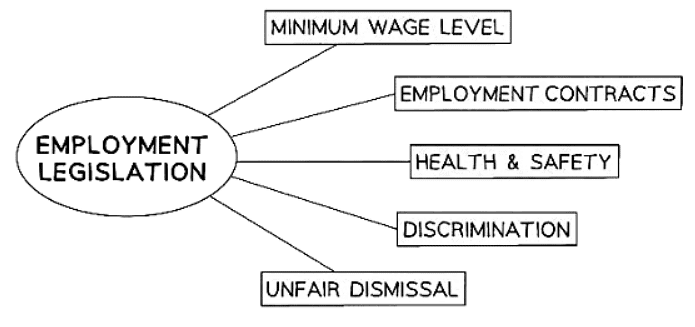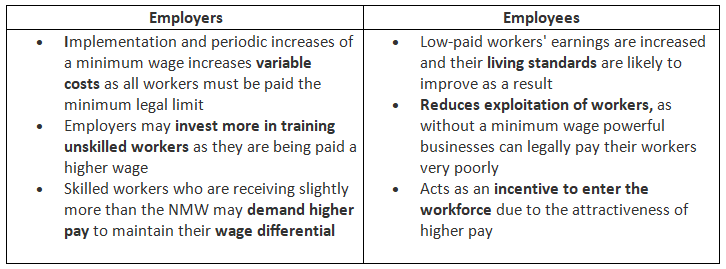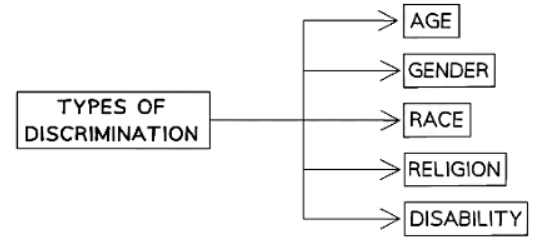Class 10 Exam > Class 10 Notes > Business Studies for GCSE/IGCSE > The Impact of Legislation on Employment
The Impact of Legislation on Employment | Business Studies for GCSE/IGCSE - Class 10 PDF Download
| Table of contents |

|
| Legal Controls & Their Impact on Business |

|
| Legal Minimum Wage |

|
| Employment Contracts |

|
| Health and Safety Regulations |

|
| Discrimination |

|
| Unfair Dismissal |

|
Legal Controls & Their Impact on Business
- Legislation refers to laws and regulations passed by governments that require businesses to conduct their behavior in a particular manner
- Many countries have passed laws that determine the required behavior of employers towards their workers
Legal Controls over Business

Legal Minimum Wage
- A national minimum wage (NMW) refers to a mandated minimum level of pay that employers are obligated to provide to their employees. This wage is established above the prevailing market rate.
- In certain regions, the minimum wage can differ based on the age of the employee, ensuring that younger workers are also fairly compensated.
- Enforcing a minimum wage makes it unlawful for employers to remunerate their workers at an hourly rate below the specified minimum wage.
- Businesses in certain regions have the liberty to offer their employees meager wages, resulting in reduced operational expenses. This practice raises concerns regarding ethical business conduct.
- When companies pay their workers very low wages, it directly impacts their overall business costs.
- The decision of some businesses to pay inadequate wages often sparks debates about the ethical implications of such actions.
Impact of Legal Minimum Wage on Employers and Employees

Question for The Impact of Legislation on EmploymentTry yourself: What is the purpose of a legal minimum wage?View Solution
Employment Contracts
- An employment contract constitutes a legally binding agreement between an employer and employee, outlining the terms and conditions of the employment relationship.
- It's often a legal obligation for employers to furnish new employees with an employment contract.
- Typical inclusions in the contract encompass details such as employee and employer names, start date of employment, working hours, compensation, holiday entitlement, job duties, workplace location, and notice period.
- Various types of contracts exist, including full-time, part-time, job share, and zero hours contracts, which may coexist within a business.
- The contract serves to minimize misunderstandings regarding aspects like working hours, wages, and vacation time, ensuring both parties understand their obligations.
- It offers employees a degree of job security, and in case of contract breaches by the employer, such as underpayment, legal recourse is available to the employee.
- Conversely, failure to meet contractual obligations by the employee can warrant legal dismissal, such as refusal to adhere to agreed-upon work hours.
- May result in disciplinary actions or contract disputes if not resolved effectively through communication and negotiation.
Health and Safety Regulations
- Health and safety legislation mandates that businesses must ensure the physical and mental wellbeing of employees, contractors, and customers.
- It encompasses various areas, including providing adequate breaks and rest periods, regulating temperature and noise levels, furnishing safety equipment, maintaining hygienic conditions, and preventing stress.
- Implementing measures to uphold healthy working conditions entails both financial and time investments, such as staff training, adjusting working hours, organizing manuals and safety documentation, and procuring and maintaining safety equipment.
- Serious breaches of health and safety regulations can result in fines, investigations by the Health and Safety Executive, and, in severe cases, imprisonment.
Discrimination
- Discrimination at work occurs when an employer treats employees unfairly based on protected characteristics like gender or race.
- This type of discrimination is prohibited by law in many countries.
Forms of Discrimination

- Workers experiencing discrimination at work have the option to pursue legal recourse against their employer.
- Trade unions frequently assist employees in legal proceedings against employers and offer guidance and assistance throughout the process.
- Discriminatory recruitment policies can hinder businesses from attracting top talent.
- If a business is found guilty of discrimination, it risks tarnishing its reputation and facing potential damage to its image.
Question for The Impact of Legislation on EmploymentTry yourself: What is the purpose of an employment contract?View Solution
Unfair Dismissal
- Dismissal occurs when an employer terminates an employee's contract of employment within the company.
- Dismissal can be considered fair for various reasons, such as the job becoming redundant, an employee's inability to perform the job adequately due to lacking skills, long-term illness, gross misconduct like theft or violence at work, or other substantial reasons such as imprisonment.
- Unfair dismissal transpires when an employee's termination lacks a valid reason or violates government regulations, such as discrimination or evasion of redundancy payments.
- In cases of unfair dismissal, the affected worker may escalate the matter to an industrial tribunal, which independently assesses if there's a case to address.
- If the tribunal determines wrongful dismissal, the worker is entitled to compensation, and the opportunity to reclaim their job.
The document The Impact of Legislation on Employment | Business Studies for GCSE/IGCSE - Class 10 is a part of the Class 10 Course Business Studies for GCSE/IGCSE.
All you need of Class 10 at this link: Class 10
|
70 videos|93 docs|26 tests
|
FAQs on The Impact of Legislation on Employment - Business Studies for GCSE/IGCSE - Class 10
| 1. How does the legal minimum wage impact businesses? |  |
Ans. The legal minimum wage sets a baseline for wages that employers must pay their employees. This can increase operating costs for businesses, especially for small businesses with tight profit margins.
| 2. What are the implications of employment contracts on businesses? |  |
Ans. Employment contracts outline the terms and conditions of employment, including job responsibilities, compensation, and benefits. Businesses must comply with the terms of the contract and any legal requirements related to employment.
| 3. How do health and safety regulations affect businesses? |  |
Ans. Health and safety regulations require businesses to provide a safe working environment for their employees. Failure to comply with these regulations can result in fines, lawsuits, and damage to the business's reputation.
| 4. How does discrimination legislation impact businesses? |  |
Ans. Discrimination legislation prohibits businesses from discriminating against employees based on protected characteristics such as race, gender, or disability. Businesses must ensure their policies and practices are in compliance with these laws to avoid legal repercussions.
| 5. What are the consequences of unfair dismissal for businesses? |  |
Ans. Unfair dismissal laws protect employees from being terminated without just cause. Businesses must follow proper procedures and provide valid reasons for dismissal to avoid legal action, which can result in costly legal fees and compensation payments.
Related Searches



















